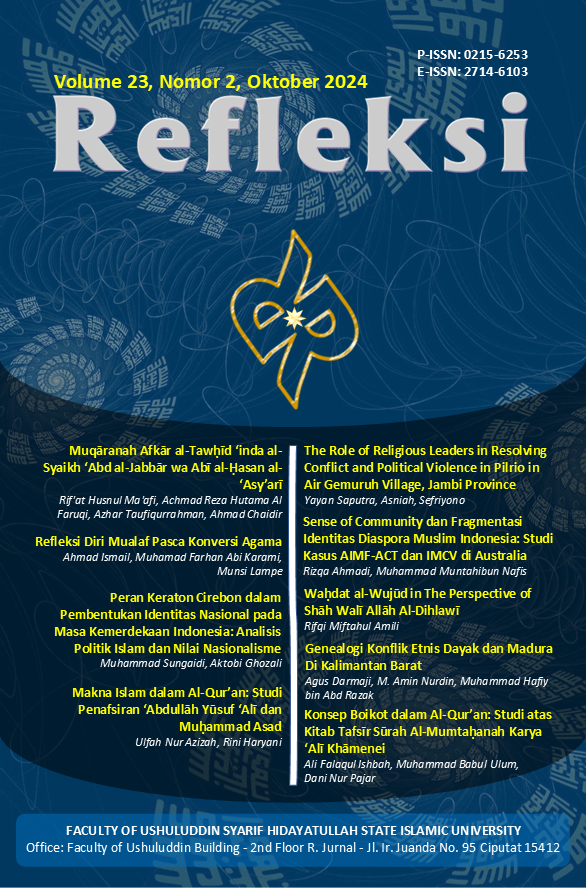Waḥdat al-Wujūd in The Perspective of Shāh Walī Allāh Al-Dihlawī
DOI:
https://doi.org/10.15408/ref.v23i2.41524Keywords:
Shāh Walī Allāh, Waḥdat al-wujūd, Tajalli A’dzamAbstract
This article aims to analyze the thought of Shāh Walī Allāh al-Dihlawī as a Sufi who accepted the doctrine of waḥdat al-wujūd, and reinterpreted it philosophically. This research confirms that the idea of sufism of Shāh Walī Allāh al-Dihlawī cannot be separated from the falsafi style. This research uses a hermeneutic approach, which is a method used to uncover the meaning of writings that become primary and secondary sources, as well as understand various kinds of facts. The primary data sources of this research are the main works of Shāh Walī Allāh al-Dihlawī which are related to his sufism ideas. Primary data is supported by authoritative secondary data, of course, which is related to his tasawwuf thought. The findings in this study are that Shāh Walī Allāh al-Dihlawī asserts that Ibn ‘Arabi’s pantheistic union with God is an experiential, and not an ontological reality (union with the divine form). Waḥdat al-wujūd, ontologically, that the only Ultimate Being is God, other than Him is a relative or contingent being. This Ultimate Being benefits the contingent being through wujūd al-munbasiṭ, which is the first emanation of the Ultimate Being. From this wujūd al-munbasiṭ will give rise to other forms (maujūdāt). On that basis, nature was created through God’s tajallī
References
Aḥmad, ‘Abd al-Fattāh Sayyid. al-Taṣawwuf baina al-Ghazālī wa Ibn Taimiyyah, Lahore: Dār al-Wafā, 2000.
Ansari, M. A. H. Sufism and Shari’ah: A Study of Shaykh Ahmad Sirhindi’s Effort to ReformSufism, Kuala Lumpur: A. S. Noordeen, 1990.
Al-’Amrī, Wafā. Shāh Walī Allāh al-Dihlawī wa Arāuhu al-Kalāmiyyah wa al-Falsafiyyah, Mesir: al-Maktabah al-Azhariyyah lī al-Turāts, 2009.
Azra, Azyumardi. Jaringan Ulama Timur Tengah dan Kepulauan Nusantara Abad XVII dan XVIII Akar Pembaruan Islam Indonesia, Jakarta: Kencana, 2007.
Bagir, Haidar. Buku Saku Tasawuf, Bandung, Arasy Mizan, 2005.
Al-Batshī, Manā Muhammad. “Juhūd al-Imām Aḥmad ibn ‘Abd al-Rahīm al-Ma’rūf bi Shāh al-Muhaddith Walī Allāh al-Dihlawī fī Naṣr al-’Aqīdah al-Salaf,” Tesis, Fakultas Ushuluddin, The Islamic University Gaza, Pakistan, 2014, 214.
Ahmad, Aziz. An Intellectual History of Islam in India, Edinburgh: University Press, 1969.
Ashfaq, Muhammad, Shah Junaid Ahmed Hashimi, and Abzahir Khan, “Shāh Walī Allah’s Interpretations of Divine Mercy (Al-Raḥmah) and Its Applications in Social Life: An Ethico-Psychological Study,” in Webology 18, no. 6, 2021, 8165.
Baljon, J. M. S. Religion and Thought of Shah Walī Allāh Dihlawī 1703-1762, Leiden: E. J. Brill, 1986.
Bakker, Anton, and Ahmad Charis Zubair, Metode Penelitian Filsafat, Kanisius: Yogyakarta, 1990.
Chittick, William C. Ibn ‘Arabi Heir to Prophet, Oxford: One Word Publications, 2007.
Esposito, John L. Islam The Straight Path: Ragam Ekspresi Menuju Jalan Lurus, trans. Arif Maftuhin, Jakarta: Dian Rakyat, 2010.
Al-Dihlawī, Shah Walī Allāh. al-Khair al-Katsīr aw Khazāin al-Hikmah, Beirut: Dar al-Kutub al-’Ilmiyyah, 2008.
_______. Lamaḥāt, ed. Ghulām Muṣṭafā Qāsimī, Hyderabad: Walī Allāh Academi, t.t.
_______. Fuyuḍ al-Haramain Ma’ā Urdū Tarjamah, ed. Khalīl Aḥmad Hydera-bad: Wali Allah Academi, 2007.
_______. al-Budūr Al-Bāzighah, ed. Saghīr Ḥasan al-Ma’sūmī, Hyderabad: Walī Allāh Academi, 1970.
_______. Ḥujjat Allāh al-Bālighah, vol. I-II, Beirut: Dār al-Kutub al-’Ilmiyah, 2005.
_______. al-Tafhīmāt al-Ilahiyyah, vol. I-II, Surat: al-Majlis al-’Ilmī, 1936.
Faruque, Muhammad U. “Sufism Contra Shariah? Shāh Walī Allāh’s Metaphys-ics of Waḥdat al-wujūd”, dalam Journal of Sufi Studies, Vol. 5 No. 27-57, 2016, 4.
Al-Ghazali, Muhammad. The Social-Political Thought of Shah Wali Allah, Islama-bad: Islamic Research Institute Islamabad, 2008.
Jalbani, G. N. Teachings of Shah Waliyullah of Delhi, Lahore: Kashmiri Bazar, 1973.
Kartal, Abdullah. “Ahmad Sirhindi’s Criticism of Waḥdat al-wujūd and Its Histor-ical Background,” in International Journal of Business and Social Science, Vol. 4 No. 1 Januari 2013, 179-180.
Kartanegara, Mulyadi. Lentera Kehidupan: Panduan Memahami Tuhan, Alam, dan Manusia, Bandung: Mizan, 2017.
Noer, Kautsar Azhari. Ibn ‘Arabi Waḥdat al-wujūd Dalam Perdebatan, Jakarta: Paramadina, 1995.
Riyadi, Abdul Qadir. Antropologi Tasawuf Wacana Manusia Spiritual dan Penge-tahuan. Jakarta: Pustaka LP3ES, 2014.
_______. Arkeologi Tasawuf Melacak Jejak Pemikiran Tasawuf dari al-Muhasibi hingga Tasawuf Nusantara, Bandung: Mizan Pustaka, 2016.
Rahman, Fazlur. Islam, Sejarah Pemikiran dan Peradaban, terj. M. Irsyad Rafsadie, Bandung: Mizan, 2017.
_______. A Studi of Islam Fundamentalism Revival and Reform in Islam, ed. Ebrahim Moosa, Oxford: Oneword, 2003.
Rizvi, Athar Abbas. Shah Wali Allah and His Times, Australia: Ma’rifat Publishing House, 1980.
Schimmel, Annemarie. Mystical Dimensions of Islam, Chapel Hill: The University of North Coralina Press, 1975.
Sandimula, Nur Shadiq. “Pemikiran Metafisika Syah Waliyullah Al-Dihlawi,” dalam Jurnal Studi Agama-Agama dan Pemikiran Islam, Vol. 20. No. 1 Maret 2022, 5.
Al-Sayālakūtī, Muḥammad Bashīr. al-Imām al-Mujaddid Al-Muḥaddits al-Shāh Walī Allāh al-Dihlawī Ḥayātuhū wa Da’watuhū, Beirut: Dār Ibn Ḥazm, 1999.
Shabbir, Ghulam and Muhammad Ibrahim, “Shah Wali Allah: Father of Muslim Modernism,” in Journal of Positive School Psychology 7, no. 2, 2023, 1327-1352.
Saeed, Abdullah. Islamic Thought an Introduction, London: Routledge, 2006.
Sirriyeh, Elizabeth. Sufis and Anti-Sufis the Defence, Rethinking and Rejection of Su-fism in The Modern Word, New York: Routledge, 2013.
Takeshita, Masataka. Insan Kamil Pandangan Ibnu ‘Arabi, terj. Harir Muzakki, Surabaya: Risalah Gusti, 1987.
Downloads
Published
Issue
Section
License
Copyright (c) 2024 Rifqi Miftahul Amili

This work is licensed under a Creative Commons Attribution 4.0 International License.








